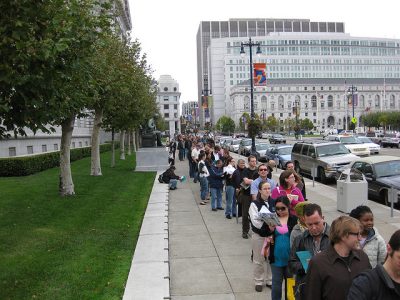Elections

In Presidential Election, “Self-Deportation” Goes Down to Defeat
It did not become certain until late Tuesday night that President Obama would win re-election. But for Mitt Romney, the campaign may have been lost during the Republican primary, when he cited “self-deportation” as the solution to our nation’s immigration problems. With the post-election dust now settled, it has become increasingly clear that supporting the idea is not only bad as a matter of policy, but also a losing political strategy. Read More

Elections Demand a New Way Forward on Immigration
Even before the election was called for President Obama last night, pundits and pollsters were remarking on the fact that immigration—or more specifically, anti-immigrant policies—were a death knell for Mitt Romney. Today, the analysis of whether and how the Republican party recovers from its devastatingly poor showing among Latinos—the key demographic group of the 21st century—is also focusing on immigration. CNN’s David Gergen noted that immigration reform would become a reality because Democrats want it and Republicans need it; even Fox news commentators grumpily acknowledged that immigration reform has got to be on the table now. Read More

A Long Journey to the Voting Booth
For some people, this year’s journey to the voting booth started years ago, in El Salvador or China or Cameroon, when it became clear that they had to leave their country and start over in America. For those people, (whom U.S. Citizenship and Immigration Services calls “Americans by choice,”) the journey to the polls has involved hardship, struggle, hundreds of hours learning English and civics, and studying for the naturalization test. They bring not only their vote to the polls, but a reminder to all of us that our precious democracy can only succeed when we believe in this country enough to take the time to vote. Read More

Drilling Down on Latino Voter Engagement
Project Vote predicts that the number of Latinos who are eligible to vote in this year’s Presidential campaign has increased by 21 percent over 2008. In 2012, nearly 24 million Latinos will be eligible to vote. The growth of this voting bloc is important to track, and much attention is paid to its growth each election season. Read More

A Growing Consensus on Supporting Immigration Reform
Immigration reform is not a “liberal” cause; it is a common-sense cause that appeals to people from a variety of political persuasions. More than a few conservative intellectuals, commentators, politicians, religious leaders, and law-enforcement officials favor revamping the U.S. immigration system to make it more responsive to the economic demands, social realities, and security concerns of the 21st century. This stance represents not only compassion, but enlightened self-interest. A growing body of evidence has quantified the enormous contributions that immigrants make to the U.S. economy through their labor, entrepreneurship, buying power, and innovation. Moreover, demographic trends point clearly to the growing electoral power of naturalized immigrants and to the native-born children of immigrants. In other words, being anti-immigrant in this day and age is self-destructive from both an economic and a political standpoint. Read More

Immigration (Finally) Takes the Stage at a Presidential Debate
George W. Bush made several appearances in last night’s presidential debate, but perhaps nowhere with greater effect than when President Obama contrasted Governor Mitt Romney’s position on immigration reform. Where President Bush supported comprehensive immigration reform, declared President Obama, Governor Romney supports “self-deportation” and Arizona style anti-immigrant laws. Moderator Candy Crowley then segued into a direct immigration question from an undecided voter about Romney’s plans for dealing with the 11 million undocumented immigrants living in our nation. The next few minutes revealed a great deal about both candidates’ positions on the immigration question, but perhaps more importantly, the points where the candidates challenged each other suggest that both parties recognize they must begin talking about immigration in new ways. Read More

Pace of DACA Approvals Quickens, but Will it be Fast Enough?
For the first time since immigration authorities officially launched Deferred Action for Childhood Arrivals in mid-August, the federal government released statistics last Friday indicating that thousands of requests have been officially granted. But while the figures themselves are an encouraging sign, other evidence suggests that most applicants will not have their requests considered until after the next presidential inauguration in January, if at all. Read More

Presidential Debates: Brought to You by an Immigrant
Millions of Americans will tune into tonight’s vice-presidential debate, but few will know the origins of the presidential debate process. While we’ve come to think of these debates as a way to learn more about the candidates vying for our votes, the idea of holding public debates, like so many other great American ideas, can be traced back to an immigrant. While we frequently note that America’s progress over generations has depended on the hard work and ingenuity of past and current generations of immigrants, it’s important to remember that ideas themselves are a benefit sometimes hard to enumerate, but critical to the American experience. Read More

Kansans Push for Kobach Recall
Activists in Kansas are mounting a campaign to recall the state’s Secretary of State and notorious immigration restrictionist Kris Kobach. According to the Associated Press, there is a movement to collect signatures to recall him. For months, several groups have held rallies and press conferences, accusing Kobach of spending too much time working on his extracurricular activities – including promoting the anti-immigrant laws he authored in other states and attending immigration-related meetings – instead of serving the people of Kansas. Read More

Naturalized Citizens Have the Power to Swing Elections
There is no doubt that immigrants are a force to be reckoned with in this year’s presidential race. After all, the Obama administration unveiled its Deferred Action for Childhood Arrivals (DACA) program in June, just a couple of months before the official start of the campaign. And Republican presidential nominee Mitt Romney has said that, if elected, he will not deport DACA beneficiaries (although he says he will discontinue the program). In other words, both candidates are going out of their way to woo immigrant voters—that is, naturalized U.S. citizens who are eligible to vote—as well as those second and third generation Americans for whom immigration is still a highly personal issue. This is smart politics. Given that the presidential election could be decided by the most razor-thin of margins, the ballots cast by naturalized citizens could prove decisive, especially in the handful of swing states upon which the election will probably hinge. Read More
Make a contribution
Make a direct impact on the lives of immigrants.
